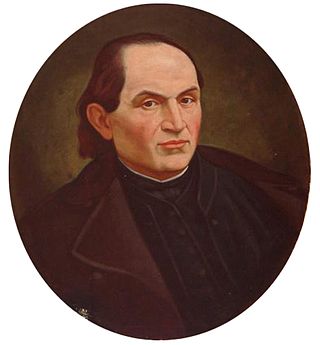Top Qs
Timeline
Chat
Perspective
Andrej Sládkovič
Slovak poet From Wikipedia, the free encyclopedia
Remove ads
Andrej Sládkovič (born as Andrej Braxatoris, pseudonyms Andrej Braxatoris-Sládkovič, Andrej Sládkovič, Ondřej Krasislav Sládkovič; 31 March 1820 – 20 April 1872) was a Slovak poet, critic, publicist, translator and Lutheran priest.
Remove ads
Life
Andrej Sládkovič was born into a family of teachers in Korpona, Hungary (now Krupina, Slovakia). His school years started in his home town (1826–30). He later attended a gymnasium in Korpona and at the Lutheran lyceums in Selmecbánya (now Banská Štiavnica) and Pozsony (now Bratislava). He continued his studies in theology at the University of Halle, Kingdom of Saxony (1843–44). After he became a pastor, he served in Horhát (now Hrochoť) from 1847 to 1856, and from then until his death in Radvány (now Radvaň, Banská Bystrica). He was a member of the Ľudovít Štúr's group and was also one of the founders of the Matica slovenská.
Remove ads
Works
- Sôvety (1843–44)
- Marína (1846, his most significant poem, also translated into Hungarian, German, Polish and French)
- Zaspievam pieseň o slobodnej vlasti (1848)
- Nehaňte ľud môj (1848)
- Detvan (1853, an opera was made in 1928)
- Milica (1858)
- Svätomartiniáda (1861)
- Pamiatka na deň 4. augusta (1863, remembers establishment of the Matica slovenská)
- Hojže, Bože, jak to bolí, keď sa junač roztratí (1863)
- Lipa cyrilo-metodejská (1864)
- Gróf Mikuláš Šubić Zrínsky na Sihoti (1866)
Sládkovič also translated works from German (Goethe), Russian (Pushkin) and French (Voltaire, Jean Racine).
Remove ads
External links
- Works by or about Andrej Sládkovič at the Internet Archive
- Andrej Sládkovič at osobnosti.sk (in Slovak)
- A complete collection of his poems available for download at Zlatý fond SME (in Slovak)
Wikiwand - on
Seamless Wikipedia browsing. On steroids.
Remove ads

